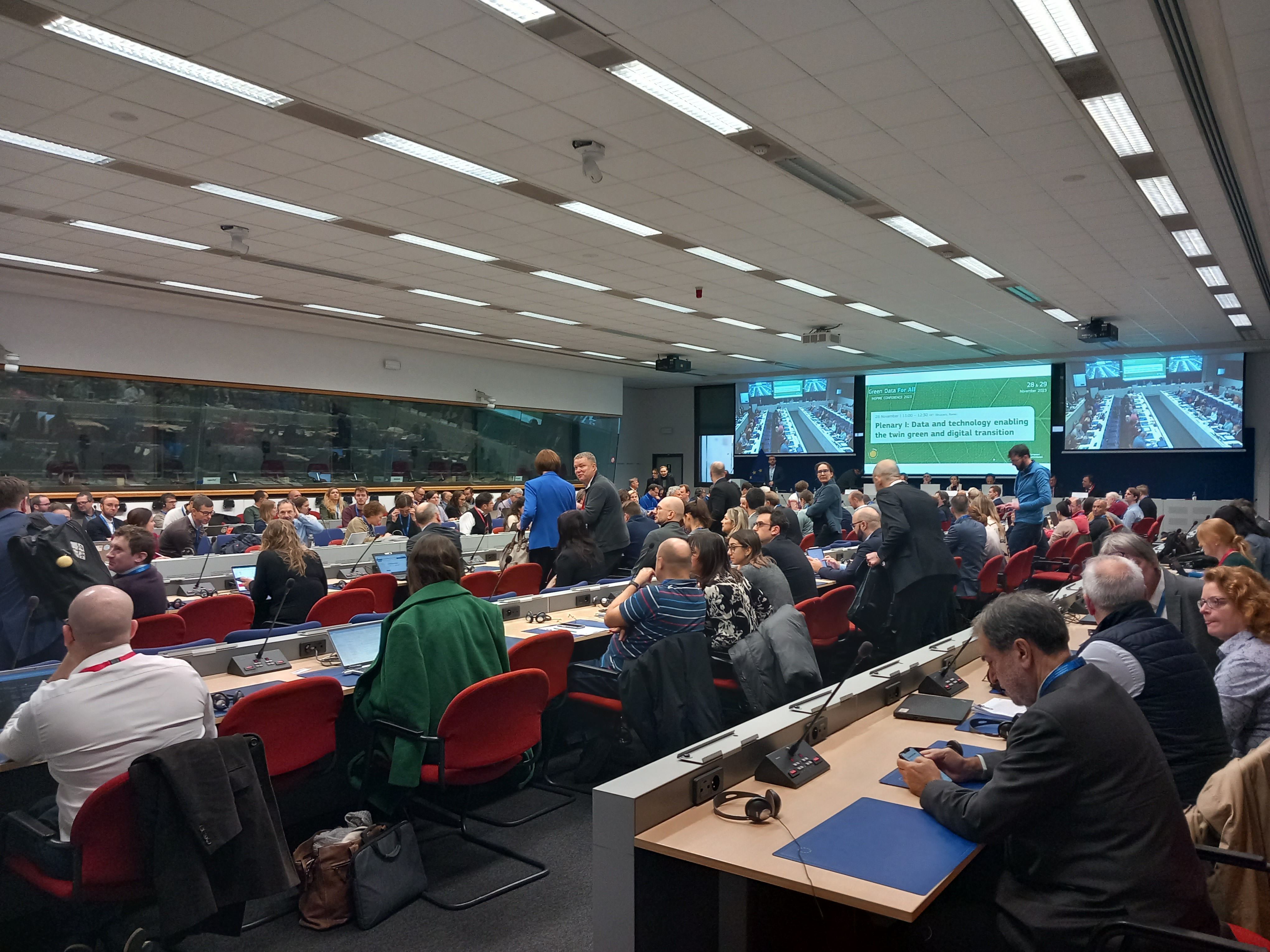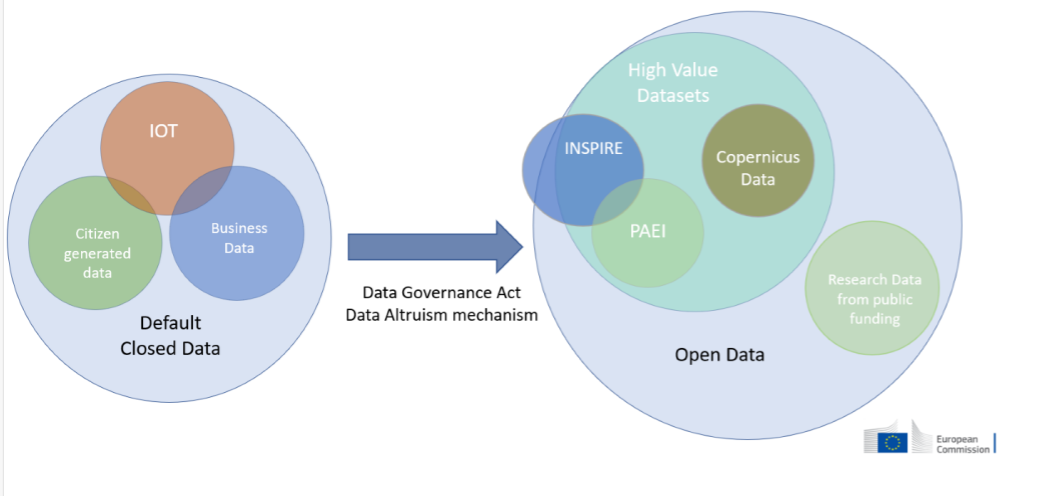– This conference had a different content than the previous ones that focused on the implementation of the INSPIRE Directive, the fulfilment of obligations and technical details. This conference focused more on utilisation and how INSPIRE is linked to the EU’s broader goals set for digitalisation and the data economy’, says Mari Laakso, Research Director at the National Land Survey of Finland (NLS).
The conference also had a more diverse group of participants. The participants came from 49 countries, of whom 250 attended the conference in-person in Brussels and the remaining 800 via a remote connection. The speakers included representatives of the European Commission, the Member States, research organisations and companies. The presentations of Kristo Lehtonen from the Finnish Innovation Fund Sitra and Antti Jakobsson and Jari Reini from the NLS highlighted Finland’s good reputation as a pioneer. Recordings of all presentations are available on the website of INSPIRE Conference 2023.

Geospatial data as part of larger information assets
Much has happened both in terms of policies and legislation in the five years after the last in-person INSPIRE conference was held. The goal of the European data strategy is to increase the availability of data, harmonise the distribution of data in the EU and build a single market for data as a counterbalance for the model of a data monopoly. This aims to create prosperity and provide citizens and companies alike with opportunities and trust regarding the use and supervision of data. Possible means include European data spaces and legislative guidance.
Data spaces mean a system of mutually agreed principles and rules to distribute and exchange data in a certain sector or between sectors. Data spaces do not require any integration between systems, as they communicate with each other via data intermediaries.
– Bringing together data infrastructures and governance infrastructures to overcome legal and technical barriers. This is the essence of data spaces’, said Ewa Malz, Head of Unit - Strategy, Digitalization, Better Regulation & Economic Analysis; DG Environment.
The EU’s goal is to build the Green Deal Data Space to enable the controlled use of https://ec.europa.eu/commission/presscorner/detail/en/IP_20_2102more diverse data in sectors in which environmental data is required.
– European land survey organisations must help ensure that geospatial and environmental data are not merely compartmentalised in a single data space built to solve environmental challenges. In contrast, they must be used broadly in and between different sectors, including the development of smart transport, simulations and virtual interaction’, says Jani Kylmäaho, Director of Development and Digitalisation at the NLS.
As a result of the INSPIRE Directive, the EU Member States have increased their technical expertise, experience and networks in implementing the principles of findable, accessible, interoperable and reusable (FAIR) data. The conference stated that the INSPIRE community plays a key role in leading the way in this new situation where spatial data is required as part of larger informations assets.
Ground rules and funding
The EU is creating ground rules for the data economy through digital regulations, including the Open Data Directive on high-value datasets, the Data Governance Act, and the Data Act issued in January 2024. The goal of the Data Governance Act is to be a multi-sectoral tool to increase trust in data transmission services and promote the voluntary sharing of data for the benefit of citizens and companies alike. The European Commission established the European Data Innovation Board (EDIB) to share best practices. The EDIB can propose guidelines for European data spaces regarding the sufficient protection of data transferred outside the EU.

Funding is mainly steered from the Digital Europe Programme, which has enabled the establishment of the Data Spaces Support Center through project funding. The goal of the Data Spaces Support Center is to help the public sector and companies and support the EDIB in improving the effectiveness and distribution of data by providing building blocks. In Finland, digital investments and digitalisation in small and medium-sized enterprises are accelerated by the Location Innovation Hub (LIH) through the more effective use of location data, which has also received funding from the Digital Europe Programme.
Opportunity to have an impact
The INSPIRE Directive, which entered into force in 2007, is being amended to make geospatial data that supports the environmental policy respond to larger data needs. The goal is to simplify technical requirements and shift to more flexible and agile data ecosystems, merge geospatial data with other data, and the other way round.
The process started from the European Data Strategy’s goal to develop the Green Deal Data Space. This includes the GreenData4All initiative whose goal is to modernise the INSPIRE Directive and the directive on public access to environmental information so that they correspond to changed data needs, taking into account new acts and political goals regarding the data economy and the previously conducted INSPIRE evaluation.
The INSPIRE conference provided stakeholders with an opportunity to learn more about the first results of the GreenData4All initiative’s impact assessment. The European Commission collected the views of the Member States and stated that the impact assessment will continue in early 2024 with the call for evidence phase, during which stakeholders in the Member States can express their views in the Have your say portal. It will be followed by 12 weeks of stakeholder consultations. The European Commission will work on the legal amendment for the rest of the year and present it in 2025 to the new Parliament to be elected in 2024. The amended directive would enter into force no earlier than at the beginning of 2026. Until then, the INSPIRE Directive will be implemented in its current format.
We will announce the start of the call for evidence phase on the Paikkatietoikkuna service’s Facebook and X pages. The European Commission would like to receive feedback from all relevant parties, not only single feedback per Member State.
Additional information:

